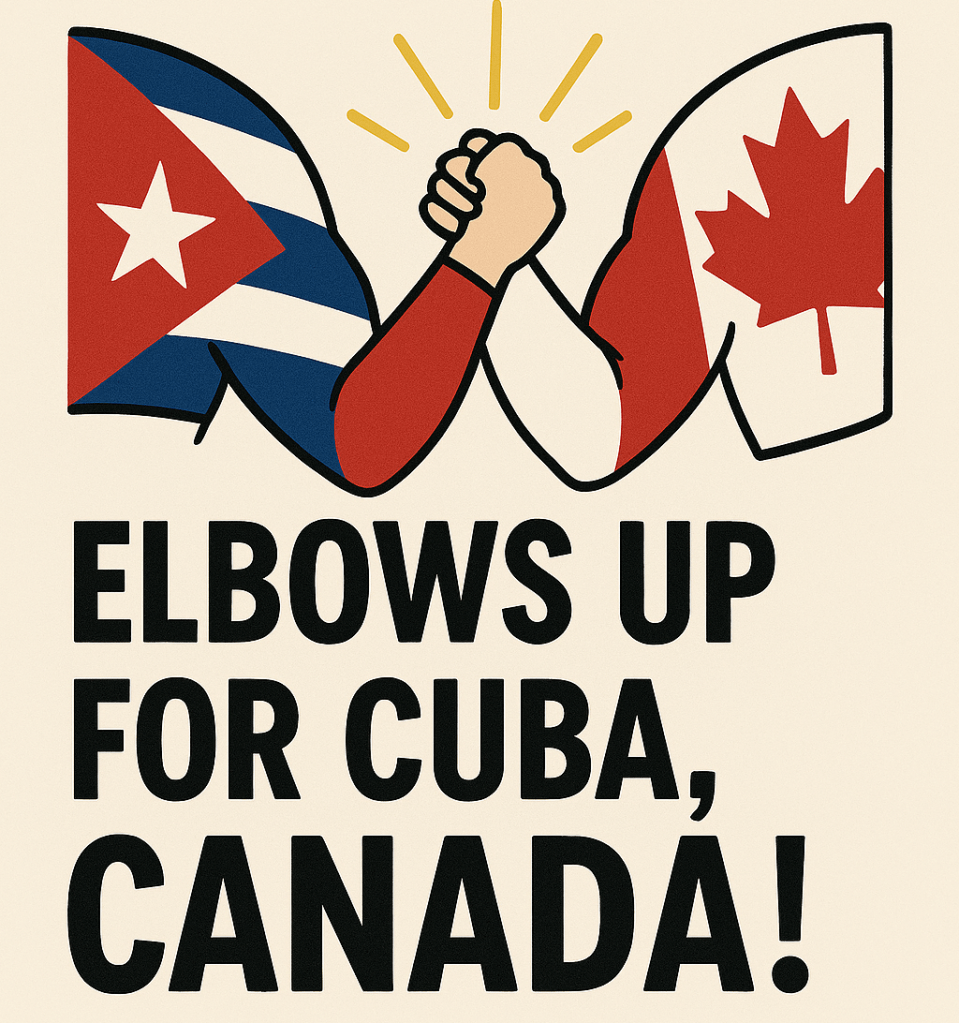
The United States has ramped up its decades-long campaign to smash its tiny Caribbean neighbour. While the country has been plagued with shortages of essential goods since the end of the Covid-19 pandemic, recent US measures to starve the country of fuel have made a bad situation much worse. The US oil blockade amounts to a state of war and the American government has threatened dire consequences for any country that comes to Cuba’s aid.
So, what’s a freedom loving human to do in the face of Yankee aggression? Here are some suggestions.
Tell Carney to “Elbows Up” for Cuba
Canada’s relationship with Cuba has been mixed. On one hand, we’ve had diplomatic relations with Cuba since 1945 and trade relations since the 18th century. Canadians account for one-third of Cuba’s tourists and we’ve held that number one spot for many years. On the other, there are documented instances of Canada spying on Cuba for the United States.
Canada has long claimed its generally friendly relations with Cuba in the context of Yankee hostility as evidence of Canada’s independent foreign policy. One way we can help Cuba is to compel our government to provide real support Cuba in the face of US aggression.
There is an online petition to the House of Commons calling for the Canadian Government to assist the people of Cuba in resisting United States aggression. Specifically, the petition calls on our government to:
- Publicly condemn U.S. aggressions as violations of international law;
- Refuse to participate in, support, or legitimize military, economic, or political aggressions against Venezuela and other countries;
- Reaffirm and actively support the Caribbean as a Zone of Peace, free from external military intervention;
- Actively reject any and all interventions and military aggressions against Cuba, Colombia and Mexico;
- Firmly oppose U.S. economic and other coercive measures against Cuba and vigorously advocate for their removal;
- Deepen economic ties, trade and assistance to Cuba; and
- Unequivocally uphold and promote the right of self-determination of the peoples and countries of Latin America and the Caribbean.
If you wish to sign this petition, do so, here, before April 20, 2026.
Additionally, the Canadian Foreign Policy Institute and Just Peace Advocates are conducting an online email campaign that calls on our federal government to sell oil, food and medicine to Cuba. You can join in here.
Finally, you can contact for MP directly (and senator(s) as well). All of their contact information is available here.
There is even a Canada-Cuba Parliamentary Friendship group . It is time to remind our Parliamentarians of its existence.
Get your own “elbows up!”
On a more individual, person-to-person basis, you can plug into local activities with your nearest Canada-Cuba friendship committee, of which there are many across Canada. The umbrella organization for most if not all of there groups is the Canadian Network on Cuba. The CNC is an excellent source of information about Cuba solidarity and the many groups across Canada that you can work with.
Many peace groups are actively supporting Cuba and other countries struggling against imperialism. The Canada-Wide Peace and Justice Network is a good place to find local groups and national news.
If you belong to a union, it may have a social justice or international solidarity committee or program. Many churches have social justice and/or international development programs.
Information is Power
You have to keep informed. There is so much contradictory information, disinformation and outright bullshit, it is often difficult to know what is going on. With regard to Latin America and the Caribbean, here are some sources that I have found to be helpful:
